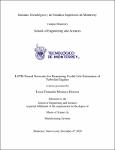| dc.contributor.advisor | Morales Menéndez, Rubén | |
| dc.contributor.author | Montoya Herrera, Luisa Fernanda | |
| dc.creator | MORALES MENENDEZ, RUBEN; 30452 | |
| dc.date.accessioned | 2021-10-16T22:44:11Z | |
| dc.date.available | 2021-10-16T22:44:11Z | |
| dc.date.created | 2020-12-04 | |
| dc.date.issued | 2020-12-04 | |
| dc.identifier.citation | Montoya Herrera, L.(2020). LSTM Neural Networks for Remaining Useful Life Estimation of Turbofan Engines (Tesis Maestría). Instituto Tecnológico y de Estudios Superiores de Monterrey. Recuperado de: https://hdl.handle.net/11285/640560 | es_MX |
| dc.identifier.uri | https://hdl.handle.net/11285/640560 | |
| dc.description | 0000-0003-0498-1566 | es_MX |
| dc.description.abstract | Condition-based Maintenance is a maintenance strategy that monitors the actual condition of
a system to make predictive decisions whit respect to it. This type of maintenance includes detection, diagnosis, and prediction of system failures. It has become increasingly important because
it generates the least losses, reducing total maintenance costs in a business by 5In general, the
Remaining Useful Life estimation allows making failure predictions. The complexity of failure
prediction in mechanical systems has led to a significant amount of literature. Different solutions
have been proposed; however, this still a real problem.Remaining Useful Life estimation can be
done from other approaches, for example, using physical models, knowledge-based models, or
data-driven models. Extracting relevant features from raw data using physical or knowledge-based
techniques alone, in most cases, is not enough due to the complexity of the characteristics present
in the data. Literature shows that data-driven approaches are the most used for prediction.
In recent years, Deep Learning models for different applications have been used, including
failure detection, diagnosis, and prediction. The Deep Learning model’s advantage is that an indepth knowledge of the system is not required, and due to its robustness, complex learning results
are satisfactory. For Remaining Useful Life estimation, Long Short Term Memory neural networks
are a viable option since they can adequately handle the time series needed for failure predictions
using Remaining Useful Life estimation.
The three main stages for developing this method based on Long Short Term Memory neural networks were data pre-processing, model training, and model performance evaluation. The
methodology uses two datasets of turbofan engines with different operational conditions and faults
for its validation. The process evaluates signals obtained from sensors located along with a turbofan engine simulated through a Simulink-based program.
This methodology presents a reasonably acceptable performance in terms of Root Mean Squared
Error of 2.85 with a standard deviation of 0.39. It means that on average for the engines, the failure
prediction will have an error of 3 cycles; and a Score function of 7.26 with a standard deviation
of 1.76, which is an asymmetric algorithm where late predictions are more penalized than early
predictions, increasing exponentially with the error. The proposed methodology has the advantage
of being more straightforward than other methods found in the literature. Besides, the obtained
values of the predictions are conservative. | es_MX |
| dc.language.iso | eng | es_MX |
| dc.publisher | Instituto Tecnológico y de Estudios Superiores de Monterrey | es_MX |
| dc.relation.isFormatOf | versión publicada | es_MX |
| dc.relation.isreferencedby | REPOSITORIO NACIONAL CONACYT | |
| dc.rights | openAccess | es_MX |
| dc.rights.uri | http://creativecommons.org/licenses/by-nc-nd/4.0 | es_MX |
| dc.subject.classification | INGENIERÍA Y TECNOLOGÍA::CIENCIAS TECNOLÓGICAS::TECNOLOGÍA E INGENIERÍA MECÁNICAS | es_MX |
| dc.subject.classification | INGENIERÍA Y TECNOLOGÍA::CIENCIAS TECNOLÓGICAS::INGENIERÍA Y TECNOLOGÍA AERONÁUTICAS | es_MX |
| dc.subject.lcsh | Technology | es_MX |
| dc.title | LSTM Neural Networks for Remaining Useful Life Estimation of Turbofan Engines | es_MX |
| dc.type | Tesis de Maestría / master Thesis | es_MX |
| dc.contributor.department | School of Engineering and Sciences | es_MX |
| dc.subject.keyword | LSTM | es_MX |
| dc.subject.keyword | RUL | es_MX |
| dc.subject.keyword | Prediction | es_MX |
| dc.subject.keyword | Prognosis | es_MX |
| dc.subject.keyword | Deep Learning | es_MX |
| dc.contributor.institution | Campus Monterrey | es_MX |
| dc.contributor.cataloger | tolmquevedo, emipsanchez | es_MX |
| dc.description.degree | Master of Science In Manufacturing Systems | es_MX |
| dc.audience.educationlevel | Investigadores/Researchers | es_MX |
| dc.relation.impreso | 2020-12-04 | |
| dc.identificator | 7||33||3301 | es_MX |



